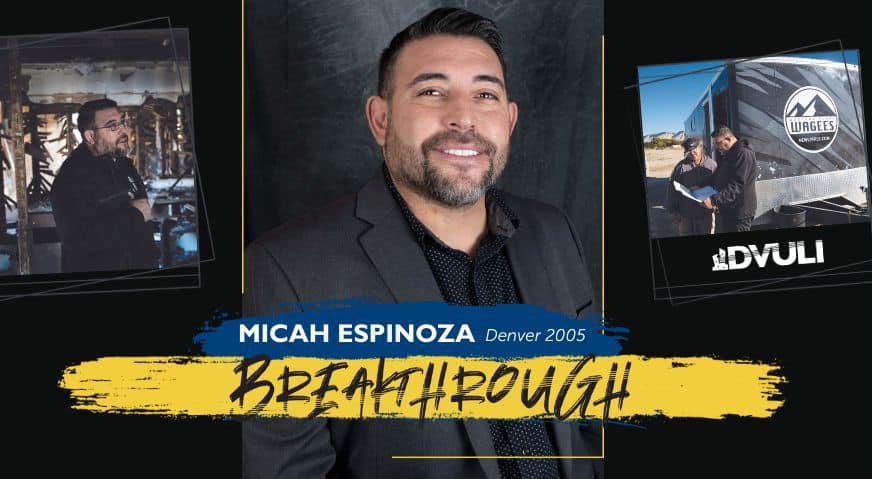Breakthrough: Micah Espinoza
Posted by: DVULI | December 5, 2023

By Gerald Bell (Kansas City 2003)
For nearly two decades, Micah Espinoza (Denver 2005) was a full-time church-based pastor and executive director of a nonprofit that worked with the unchurched in Southwest Denver. He gave everything he had to his work and the church that nurtured him in his faith and leadership. Coupled with meeting the high demands the ministry placed on him, Micah had a wife and three children to support. His dedication to church was never about money; he often considered doing something else. To hear him tell it, “I struggled to make ends meet, but I stayed focused on God’s calling. I am here today because I pushed through when others quit.” He kept Proverbs 3:5-6 hidden in his heart and was open to whatever came, even if that meant doing something different.
“I struggled to make ends meet, but I stayed focused on God’s calling. I am here today because I pushed through when others quit.”
After nearly 17 years of church service, the Lord began bringing new opportunities. He always had a heart for the poorest and most vulnerable people in the community. “It didn’t matter if they were youth, adults, addicts, or homeless—I would help anyone who needed help,” Micah says. Ultimately, he resigned from the church and relocated from Denver, Colorado, to a much smaller Grand Junction, Colorado (population 160,000), with family in tow. There, Micah assumed an associate pastor role and took over the leadership of a prisoner re-entry program funded by the state. His entrepreneurial and trailblazing spirit began to shine. He started with one staff member, a small caseload, and nothing else.
The rural area where he now lives and serves contends with the typical challenges impoverished neighborhoods face. Counties identified as being in persistent poverty are typically less populous and make up 10.9 percent of counties but only 6.1 percent of the U.S. population. Grand Junction was no different. Poverty brings crime, addiction, incarceration, homelessness, violence, unemployment, and health care deficiencies. “My goal was to be a youth pastor until the day I die, but the Lord had other plans,” Micah says. The relocation and new leadership roles have meant higher responsibilities that Micah has fully embraced.
After three years of running the re-entry program at the church, it had outgrown the church, its facilities, and the vision of senior leadership. In October 2020, he incorporated The Freedom Institute (TFI) as an independent ministry. TFI exists to break the generational cycle of poverty and incarceration in forgotten communities. “We’re helping people coming out of prison, county jail, addiction, and homelessness to gain the stability factors that lead to significant, strategic, and sustained success,” he says.
“We’re helping people coming out of prison, county jail, addiction, and homelessness to gain the stability factors that lead to significant, strategic, and sustained success.”
TFI has grown to have a housing inventory of 14 properties with 110 tenants,” Micah explains. “We now provide targeted case management, stable housing, employment through our social enterprises, and recovery services. We have also engaged the leaders and youth with lived experience to do advocacy at a policy level. The youth are now becoming community leaders and launching new programs for young people.” He continues, “We are moving money in statute, pioneering new ways of ministry among the poor.”
Under his guidance, the mission of TFI skyrocketed over a very short time. The average under-resourced urban leader would need multiple years to establish what has taken him less than six years. TFI has built an agency with strategic wraparound services that address the needs of the most vulnerable in the community. “I didn’t see any of this coming when I was a full-time youth pastor,” exclaims Micah, looking back at his ministry trajectory. “What I learned in DVULI was a huge part of getting here.” The impact he is seeing is the direct result of all five DVULI core values working together hierarchically.
“What I learned in DVULI was a huge part of getting here.”
With all the strategic and significant developments that have emerged for Micah in church and para-church leadership, he’s not one to forget how it feels to be limited or stuck in poverty because he lived through that reality as a child and an adult. “I never felt my path was a common path to anything. I have always had a bit of chip on my shoulder that I think is positive,” describes Micah, who’s known for being a straight-shooting communicator. “I am not perfect and take risks. If it weren’t for people like me, we wouldn’t have ended up in these places of innovation and service. I have learned to love myself exactly the way He made me.”
The youth in his life continue to be a driving force for Micah, including his biological sons. He now finds time to be a paid assistant wrestling coach at Central High School in Grand Junction. “I have become healthier in every way. God has brought youth ministry back to me,” he says of his coaching position. “Coaching wrestling is my balance. It refuels me. I love kids, that environment, competing, the combat, and all that. Plus, I still have something to say and something to offer. I have something of value to give to youth, and I want to give this truth from deep inside me.”
Today, Micah has nearly 30 employees and a multimillion-dollar organization. “There’s no shortcut to this,” Micah insists. “I’m not here because of me. It’s a testament to God and His value in me. I have chosen to get up and keep going when everything in me said not to. God is faithful, and breakthrough is possible!”
“I’m not here because of me. It’s a testament to God and His value in me. I have chosen to get up and keep going when everything in me said not to. God is faithful, and breakthrough is possible!”
# # #

